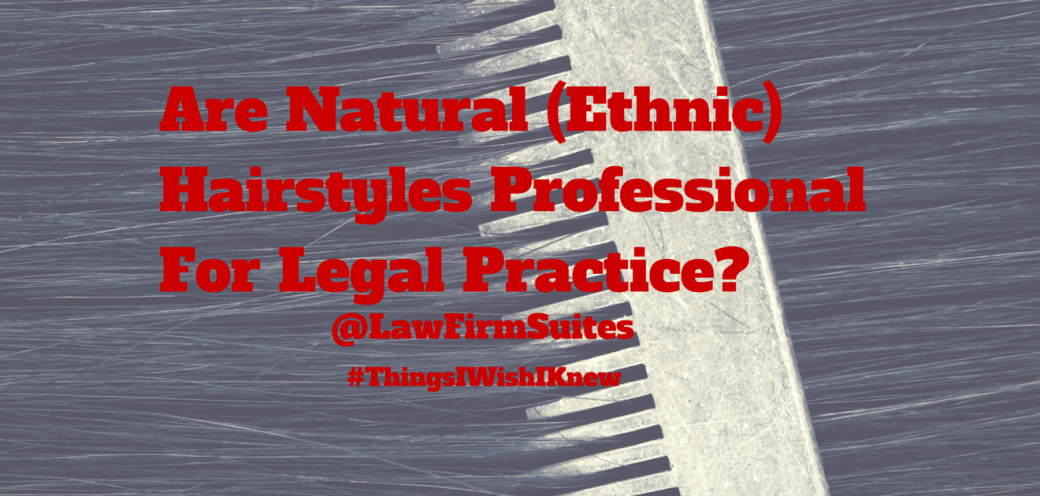In this week’s edition of Things I Wish I Knew, solo attorney, Joleena Louis gives us her thoughts on “natural hair” and whether it is appropriate or not for an attorney in practice.
One of the benefits of being a solo is that I get to choose my own dress code.
I like to think I dress very professionally most of the time; I almost always wear a suit when meeting clients and going to court and I dress never anything less than business casual.
While I agree that hair is part of your overall professional look, it never occurred to me that my decision to stop chemically straightening my hair could possibly be viewed as unprofessional.
Chemically straightening my hair really has adverse effects.
For most of my life, I have chemically straightened my hair.
It was something that my mother started when I was a child and I just kept it up because I believed my natural hair texture would be unruly otherwise.
As an adult, I’ve learned just how damaging chemical straightening is to my hair and recently made the decision to stop.
As an adult, I’ve learned just how damaging chemical straightening is to my hair Click To TweetI went natural, but professionalism came into question.
While deciding what to do with my hair, I choose to wear twists as a protective style for the summer.
I thought this particular style looked professional and I mostly wore it in a neat bun while working and within the first few days of having the style, another African-American attorney in my office suite said she was thinking about getting her hair done the same way.
However, she wasn’t sure if it was “professional.”
I was colossally confused when my hair came into question.
My confusion was evident and I was even a bit defensive about it.
It’s just hair! It looked nice and neat to me so why should anyone be concerned about it?
I started paying closer attention to others reactions to my hair, which was mostly no reaction at all. Some of my clients and even one judge commented that they liked my new hairstyle.
Lots of women on the street asked where I got it done. And that was it.
My curiosity was piqued, so I started asking other attorneys how they felt about the professionalism of “ethnic” or “natural” hair. Were my twists professional? What about dreads or an afro? Does it really matter?
Neatness is what matters with hair as an NYC solo.
For the most part, as long as my hair was neat and polished, most of the attorneys in New York thought it was professional. However, NYC is a different arena where fashion and beauty is used as a way to express yourself and for many it is a way of life.
I have heard stories from attorneys outside of New York City where natural and protective styles are not the norm. They were told by mentors, supervisors or HR that they should straighten their hair.
This was not limited to women of color either. Even women of other races with naturally curly hair were given this advice.
The whole concept of natural hair and legal practice seems ridiculous to me. Shouldn’t I be focusing on the quality of my work instead of my hair style?
Shouldn’t I be focusing on the quality of my work instead of my hair style? Click To TweetAs long as my hair is neat, clean and well kept, it should not be a topic of discussion.
Rocking my natural curls does not affect my ability as a lawyer and the best part of being a solo is having control over who I choose to work with. If I have to change my hair to get a certain client, they are not the client for me anyway.
What do you think about different hairstyles and solo practice? Comment below and give us your thoughts!




on said:
Interesting post. Funny because I remember 20 years ago lawyers who practiced in the 70’s sometimes looked like they hadn’t looked in a mirror since. Long wavy hair (well, I’m talking about caucasion dudes), fat ties, pastel shirts and colorful suits with big lapels. And then there was the white-shoe-firm “uniform”: dark suit, white starched cotton shirts, red ties, black wingtips. I was at one of those firms and I remember comments from my mentors when I deviated – “are you out of white shirts?”
We have evolved. Natural looks are acceptable if they fit the lawyer. The pot lawyer, the criminal defense lawyer – they can get away with dreadlocks and sandals. But if you are doing corporate law, you have to consider they live in a world where individuals have made significant compromises for “the firm.” They expect you to errors on the side of conservativism and conformity (even if their tagline is “think different”). There is nothing different about wearing the same uniform every day (even if it is a mock turtleneck sweater).
I slick my hair back with gel. It’s not really an ethnic look – it’s the best balance between convenient and not-too-ridiculous looking.
I personally think your hair is great, because it matches the personalit you can glean from your blog.
on said:
Thanks Peter! I think dreads are kind of misunderstood and I know many men and women who work in conservative settings and look very professional. But I agree, some places expect you to conform and its up to you to decide if you are comfortable with that.
on said:
I’ve had locks for the past 9 years without any incident. I go to my hairdresser every 3 to 4 weeks to get them washed and retwisted into a very cool style that suits me and no one else. Never had any complaints. Natural is the best.
on said:
Good piece. How we look and wear our hair has a lot to do with our attitude as well. Both go hand in hand. At the end of the day, our reputation more so than our hair will recommend us as attorneys.
on said:
You’re right, if you are happy with how you look it makes you more confident. Thanks for the comment!
on said:
You have awesome natural hair in my opinion, and look perfectly professional. I am entering the legal field as a law student, and while I do understand professionalism extends to our outward appearance and that we should stay clean and neat, I think that it ought to be considered morally reprehensible to devalue a human being’s natural hair as inherently unprofessional or as unkempt in some way.
That said, I think unnatural hairstyles should also be accepted as professional as long as they’re clean and neat. I don’t think it should be done from a place of self conscious mandate but rather free expression. It would be nice to see male lawyers with longer hair, or hilights. More freedom to color ones hair would also be neat.
I enjoyed reading your post and encourage you to always hold that your natural hair is professional by default (provided that it’s neat and clean). You should not have to risk burning yourself and spending hours maintaining a hairstyle in order to be considered a professional attorney when many attorneys only have to spend a small fraction of that time maintainjng theirs becaus they have different genes. If someone were to say to me that a hairstyle like yours was unprofessional, I probably wouldn’t be able to help myself from reprimanding them verbally, I would certainly lose some respect for them as well as faith in their ability to think like a lawyer that values affording humans a level of dignity that is equal to others when in their natural state of being.
on said:
I liked your article. This should be a non-issue.